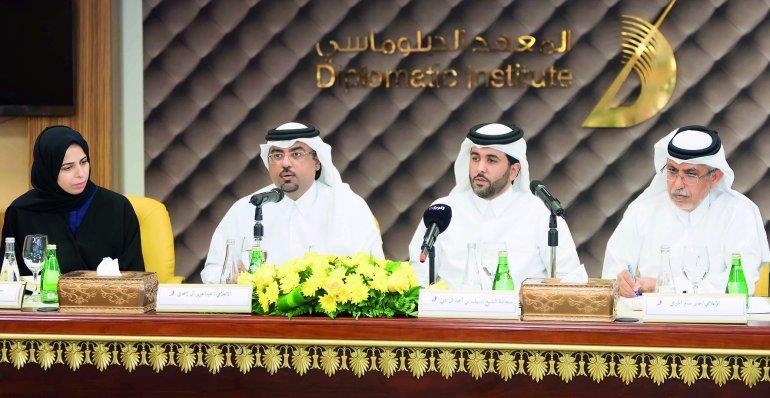
Qatar achieves great global presence
DOHA: Director of the Government Communications Office H E Sheikh Saif bin Ahmed bin Saif Al Thani said Qatar's bilateral investment and economic relations have significantly developed after the Gulf crisis.
Qatar has achieved a great global presence through the participation of ministers and officials in various external events in different countries of the world, he added.
At a panel discussion arranged by the Diplomatic Institute of the Ministry of Foreign Affairs on new media in conflict and political transformation in the Gulf region - Gulf crisis as a model, he said Qatar is not sensitive about the social media and new media on the contrary it deals with it and finds it important, because it has nothing to be afraid of.
Asked about the existence of electronic flies, Sheikh Saif bin Ahmed bin Saif Al Thani said that establishing electronic teams, known as electronic flies, is unacceptable both now and in the future as it does not comply with Qatar's policies which are based on integrity and ethics, QNA reported.
He said traditional media is easy to deal with and communicate with its personnel, whereas it is difficult to deal with what is published in the new media as it circulates and develops at an amazing speed and focuses on the social aspects more than any other area.
The Director added that dealing with this media requires speed, accuracy, focus and credibility. It also requires that a reaction is only given to major issues and to not be dragged into sub-issues and side bickering.
He highlighted that during the first five months of the crisis, the communications office held more than 500 television interviews and local and international press interviews with ministers and state officials to present the Qatari point of view and to inform the Qatari public and the world about the latest developments in the crisis and its repercussions.
Foreign Ministry Spokesperson H E Lulwah Al Khater spoke about means of communication and the development of the media and its relation with different levels of society and the public domain.
She presented the stages of development of mass media since its establishment through printed newspapers and cultural salons which initially aimed to the rationalization of dialogue, providing information and developing ideas through the intellectual class.
Al Khater said that with the spread of visual media, the information started to reach other uneducated classes, whose roles were limited to receiving the information. This encouraged the capitalist class to acquire these means and try to produce information and news to suit their wishes and goals.
She added that the next phase included the social media which changed the structure of the public domain including Twitter, Facebook, Snapchat and others. These domains created a case of 'fragmentation in the public, where anyone can identify with alternative communities that are separate from their social, religious, spatial and temporal space, thus creating a change in the cultural environment within one society. Al Khater said these media outlets have also allowed a person to waste temporal, circumstantial and spatial context to achieve their personal purposes by fabricating images, videos and audio tracks and gluing them to other societies with no truth, where she highlighted that such actions are currently happening with Qatar through the current Gulf crisis. Abdulaziz Al Ishaq differentiated between social media and new media, referring to the attempts adopted by some countries in the Arab region to change the community's awareness. This takes place through establishing satellite channels, radio stations, newspapers and websites. He pointed to the Saudi Arabian model in producing community awareness and changing it in the Gulf region, in addition to the UAE's role which seeks to acquire successful experiences in this context and politicise these sites and media to serve their objectives.
Al Ishaq spoke about fake news items and how to identify them, as well as the need to deal with social media professionally to produce new media and deal with it by raising political awareness and making the Qatari people able to address any larger and more serious local issue. He also called on spreading the culture of accepting criticism and dealing with reality. The discussion panel, moderated by Jaber Al Harmi, comes within the series of seminars and events organised by the Diplomatic Institute on a number of local, regional and international issues.

Legal Disclaimer:
MENAFN provides the
information “as is” without warranty of any kind. We do not accept
any responsibility or liability for the accuracy, content, images,
videos, licenses, completeness, legality, or reliability of the information
contained in this article. If you have any complaints or copyright
issues related to this article, kindly contact the provider above.


















Comments
No comment